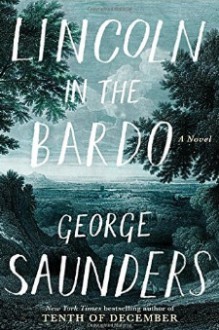
I thank NetGalley and Bloomsbury Publishing for providing me an ARC copy of this novel that I freely chose to review.
First, in case you have not read the book or anything about it, and wonder what the bardo of the title refers to, it is a Buddhist concept (in Tibetan Buddhism, it seems, and I’ve read that Saunders is a Buddhist) referring to an intermediate state between death and rebirth (between two lives on Earth).
Now that we’ve cleared that out, if you follow my blog, you might remember that I reviewed some of the books that had made the long and the short-list of the Booker Prize. I enjoyed some of them more than others, but I had not read the book that actually won the Prize, and when I saw it come up on NetGalley, I could not resist. I had heard and read a great deal about it, and I felt I had to check it for myself.
This is not a standard novel. It is composed of fragments, divided into chapters, some that appear to contain extracts from a variety of written historical documents (diaries, newspapers, books, memoirs) which provide background to the events, Lincoln’s presidency and the tragic death of his son, Willie, victim to typhoid fever. Other chapters, also fragmented, contain first-person observations by a large variety of characters that ‘live’ at the cemetery where Willie is laid to rest. Call them ghosts, spirits, or whatever you prefer, they seem to have been there for a while, some longer than others, and they interact with each other, while at the same time talking about themselves and taking a keen interested on little Willie Lincoln and his father. We have the spirits of black and white characters, young and old, men and women, well-off citizens and paupers, people who had lead seemingly morally exemplary lives and others who had gone down the wrong path, some who had taken their own lives, others who had died by accident or in bed. There are some actively atoning for their sins while others only seek entertainment. They are a motley crew, and although we hear mostly from three of these characters (Hans Vollman, Roger Bevins, and the Reverend Everly Thomas) and from Willie, they all make important contributions and help create a whole that is more than its parts.
The structure of the novel is puzzling and intriguing, and although it made me think of postmodernism and pastiche, the methodology used to construct the novel is not an attempt at emptying it of meaning or making us reflect upon the artificiality and futility of seeking truth and understanding. The death of a child (even if we are not parents, most of us are close enough to the children of relatives and/or friends to be able to imagine what it must be like) is a terrible tragedy and although there are light moments in the novel, there are touching and moving ones as well. Some of the fragments emphasise the diverse opinions and judgements about Lincoln and his presidency (by the way, although some of these fragments are real documents from the period, others have been created by Saunders, and it is not evident while reading which ones are which), but everybody agrees on the devastating effect the death of his son had over the president. The hopeful ending might feel somewhat surprising but is open to interpretation, like the rest of the text.
There are fragments that will make readers wonder about religious beliefs, others that question the social order, racial ideas, and the Civil War. But I fully understand the puzzlement of many readers who leave negative reviews on this book (and the negative reviews are many) stating that they don’t understand anything, it goes over their heads, and it is not really a novel. Some readers, familiar with Saunders’s short-stories, prefer those to the novel, but as I have not read them, I cannot comment.
Here some examples of the style of writing in the book (in this case, I definitely recommend prospective readers to check inside or get a sample to see if it suits their reading taste).
…only imagine the pain of that, Andrew, to drop one’s precious son into that cold stone like some broken bird & be on your way.
Mr. Collier (shirt clay-stained at the chest from his fall, nose crushed nearly flat) was constantly compelled to float horizontally, like a human compass needle, the top of his head facing in the direction of whichever of his properties he found himself most worried about at the moment.
The money flows out, tens of thousands of men wait, are rearranged to no purpose, march pointlessly over expensive bridges thrown up for the occasion, march back across the same bridges, which are then torn down. And nothing whatsoever is accomplished.
Blame and Guilt are the furies that haunt houses where death takes children like Willie Lincoln; and in this case there was more than enough blame to go around.
The book collects a large number of endorsements and reviews at the end, and I’ve chosen this one by James Marriott, from The Times, for its briefness and accuracy: ‘The book is as weird as it sounds, but it’s also pretty darn good.’
In sum, this is a highly experimental book, for readers who enjoy a challenge and don’t mind a non-linear narrative, who enjoy literary fiction not focused on plot, and are intrigued by new writers and what makes critics tic. It is not an easy read, but it is a rewarding one and I, for one, hope to catch up on some of the author's previous books.


 Log in with Facebook
Log in with Facebook 















